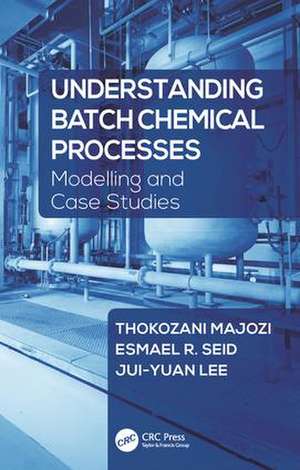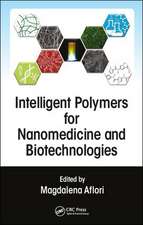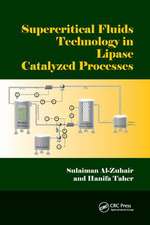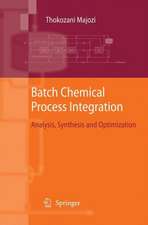Understanding Batch Chemical Processes: Modelling and Case Studies
Autor Thokozani Majozi, Esmael R. Seid, Jui-Yuan Leeen Limba Engleză Hardback – 22 feb 2017
With this inclusive guide to batch chemical processes, the author introduces the reader to key aspects in mathematical modeling of batch processes and presents techniques to overcome the computational complexity in order to yield models that are solvable in near real-time. This book demonstrates how batch processes can be analyzed, synthesized, and designed optimally using proven mathematical formulations. The text effectively demonstrates how water and energy aspects can be incorporated within the scheduling framework that seeks to capture the essence of time. It presents real-life case studies where mathematical modeling of batch plants has been successfully applied.
| Toate formatele și edițiile | Preț | Express |
|---|---|---|
| Paperback (1) | 456.63 lei 6-8 săpt. | |
| CRC Press – 10 dec 2019 | 456.63 lei 6-8 săpt. | |
| Hardback (1) | 1017.18 lei 6-8 săpt. | |
| CRC Press – 22 feb 2017 | 1017.18 lei 6-8 săpt. |
Preț: 1017.18 lei
Preț vechi: 1367.99 lei
-26% Nou
Puncte Express: 1526
Preț estimativ în valută:
194.64€ • 208.13$ • 162.28£
194.64€ • 208.13$ • 162.28£
Carte tipărită la comandă
Livrare economică 17 aprilie-01 mai
Preluare comenzi: 021 569.72.76
Specificații
ISBN-13: 9781498773171
ISBN-10: 1498773176
Pagini: 330
Ilustrații: 50
Dimensiuni: 156 x 234 x 24 mm
Greutate: 0.59 kg
Ediția:1
Editura: CRC Press
Colecția CRC Press
ISBN-10: 1498773176
Pagini: 330
Ilustrații: 50
Dimensiuni: 156 x 234 x 24 mm
Greutate: 0.59 kg
Ediția:1
Editura: CRC Press
Colecția CRC Press
Cuprins
Introduction to Batch Processes. Modelling for Effective Solutions: Reduction of Binary Variables. Methods to Reduce Computational Time: Prediction of Time Points. Integration of Scheduling and Heat Integration: Minimization of Energy Requirements. Heat Integration in Multipurpose Batch Plants. Design and Synthesis of Heat-Integrated Batch Plants Using an Effective Technique. Simultaneous Scheduling and Water Optimization: Reduction of Effluent in Batch Facilities. Optimization of Energy and Water Use in Multipurpose Batch Plants Using an Improved Mathematical Formulation. Targeting for Long-Term Time Horizons: Water Optimization. Long-Term Heat Integration in Multipurpose Batch Plants Using Heat Storage.
Notă biografică
Thokozani Majozi is a full professor in the School of Chemical and Metallurgical Engineering at Wits University where he also holds the NRF/DST Chair in Sustainable Process Engineering. His main research interest is batch chemical process integration, where he has made significant scientific contributions that have earned him international recognition. Some of these contributions have been adopted by industry. Prior to joining Wits, he spent almost 10 years at the University of Pretoria, initially as an associate professor and later as a full professor of chemical engineering. He was also an associate professor in computer science at the University of Pannonia in Hungary from 2005 to 2009. Majozi completed his PhD in Process Integration at the University of Manchester Institute of Science and Technology in the United Kingdom. He is a member of Academy of Sciences of South Africa and a Fellow for the Academy of Engineering of SA. He has received numerous awards for his research including the Burianec Memorial Award (Italy), S2A3 British Association Medal (Silver) and the South African Institution of Chemical Engineers Bill Neal-May Gold Medal. He is also twice a recipient of the NSTF Award and twice the recipient of the NRF President’s Award. Majozi is author and co-author of more than 150 scientific publications, including 2 books in Batch Chemical Process Integration published by Springer and CRC Press in 2010 and 2015, respectively.
Esmael Seid obtained his B.Sc. in Chemical Engineering from Bhair Dar University, Ethiopia. He then worked in process industry for three years after his B.Sc. before joining University of Pretoria, South Africa, in 2009, where he obtained his MScEng and PhD degrees in Chemical Engineering. Dr Seid has several publications in international refereed journals on design, synthesis, scheduling, and resource conservation, with particular emphasis on water and energy for multipurpose batch plants. He is currently a visiting scholar at Chemical Engineering Department, Texas A&M University working on Sustainable process design through process integration.
Jui-Yuan Lee is an assistant professor at the Department of Chemical Engineering and Biotechnology, National Taipei University of Technology, Taiwan. Dr Lee received his PhD in Chemical Engineering from National Taiwan University (NTU) in 2011, and conducted postdoctoral research at NTU (2011-2013) and University of the Witwatersrand, Johannesburg, South Africa (2013-2014). His research centres on process integration for energy savings and waste reduction, with research interests covering low-carbon energy system planning and hybrid power system design. He has published more than 30 journal papers and 40 conference papers, and coedited a book on batch process integration. Dr Lee is working closely with several collaborators mainly in South-east Asia and Africa.
Esmael Seid obtained his B.Sc. in Chemical Engineering from Bhair Dar University, Ethiopia. He then worked in process industry for three years after his B.Sc. before joining University of Pretoria, South Africa, in 2009, where he obtained his MScEng and PhD degrees in Chemical Engineering. Dr Seid has several publications in international refereed journals on design, synthesis, scheduling, and resource conservation, with particular emphasis on water and energy for multipurpose batch plants. He is currently a visiting scholar at Chemical Engineering Department, Texas A&M University working on Sustainable process design through process integration.
Jui-Yuan Lee is an assistant professor at the Department of Chemical Engineering and Biotechnology, National Taipei University of Technology, Taiwan. Dr Lee received his PhD in Chemical Engineering from National Taiwan University (NTU) in 2011, and conducted postdoctoral research at NTU (2011-2013) and University of the Witwatersrand, Johannesburg, South Africa (2013-2014). His research centres on process integration for energy savings and waste reduction, with research interests covering low-carbon energy system planning and hybrid power system design. He has published more than 30 journal papers and 40 conference papers, and coedited a book on batch process integration. Dr Lee is working closely with several collaborators mainly in South-east Asia and Africa.
Recenzii
"Without a doubt, I would recommend this useful book to students and professionals alike who are interested in analysis, synthesis and design of batch processes because of the well-organized chapters, clear explanations, and industry-based case studies."
— Hongguang Dong, Dalian University of Technology, China
"This is a much needed and timely contribution that covers the fundamentals and applications of batch process modeling and design. The authors are very well recognized for excellent contributions in related areas. The book is ideal for educational purposes and for researchers and process engineers interested in the important field of batch processes."
— Mahmoud El-Halwagi, Texas A&M University, USA
"The book provides detailed discussion on mathematical modelling approaches for analyzing, synthesizing and design of batch processes. Heat and water integration of batch processes have been well presented in the book."
— Denny K. S. Ng, University of Nottingham, Malaysia
"The authors develop the key aspects of batch processes – modeling, scheduling, heat integration, and water optimization systematically. Each topic is covered in detail with excellent illustrations and case studies. This will provide a strong foundation to senior undergraduate and graduate students wishing to learn about batch systems."
— Rajagopalan Srinivasan, Indian Institute of Technology Gandhinagar, USA
"Taking in consideration that batch processes are often neglected in training of chemical engineers, especially from the perspective of process integration, this book is a valuable aid in knowledge transfer to the industry. The book is focused on mathematical methods giving an excellent review of their strengths and limitations with special attention on problem complexity which greatly contributes toward high computational cost, a major concern in industrial scale application. Detailed illustrative examples and industrial case studies presente
— Hongguang Dong, Dalian University of Technology, China
"This is a much needed and timely contribution that covers the fundamentals and applications of batch process modeling and design. The authors are very well recognized for excellent contributions in related areas. The book is ideal for educational purposes and for researchers and process engineers interested in the important field of batch processes."
— Mahmoud El-Halwagi, Texas A&M University, USA
"The book provides detailed discussion on mathematical modelling approaches for analyzing, synthesizing and design of batch processes. Heat and water integration of batch processes have been well presented in the book."
— Denny K. S. Ng, University of Nottingham, Malaysia
"The authors develop the key aspects of batch processes – modeling, scheduling, heat integration, and water optimization systematically. Each topic is covered in detail with excellent illustrations and case studies. This will provide a strong foundation to senior undergraduate and graduate students wishing to learn about batch systems."
— Rajagopalan Srinivasan, Indian Institute of Technology Gandhinagar, USA
"Taking in consideration that batch processes are often neglected in training of chemical engineers, especially from the perspective of process integration, this book is a valuable aid in knowledge transfer to the industry. The book is focused on mathematical methods giving an excellent review of their strengths and limitations with special attention on problem complexity which greatly contributes toward high computational cost, a major concern in industrial scale application. Detailed illustrative examples and industrial case studies presente
Descriere
The book introduces the reader to key aspects in mathematical modeling of batch processes and presents techniques to overcome the computational complexity in order to yield models that are solvable in near real-time. It demonstrates how batch processes can be analyzed, synthesized, and designed optimally using proven mathematical formulations. The book also demonstrates how water and energy aspects can be incorporated within the scheduling framework that seeks to capture the essence of time. It presents real-life case studies where mathematical modeling of batch plants has been successfully applied.










